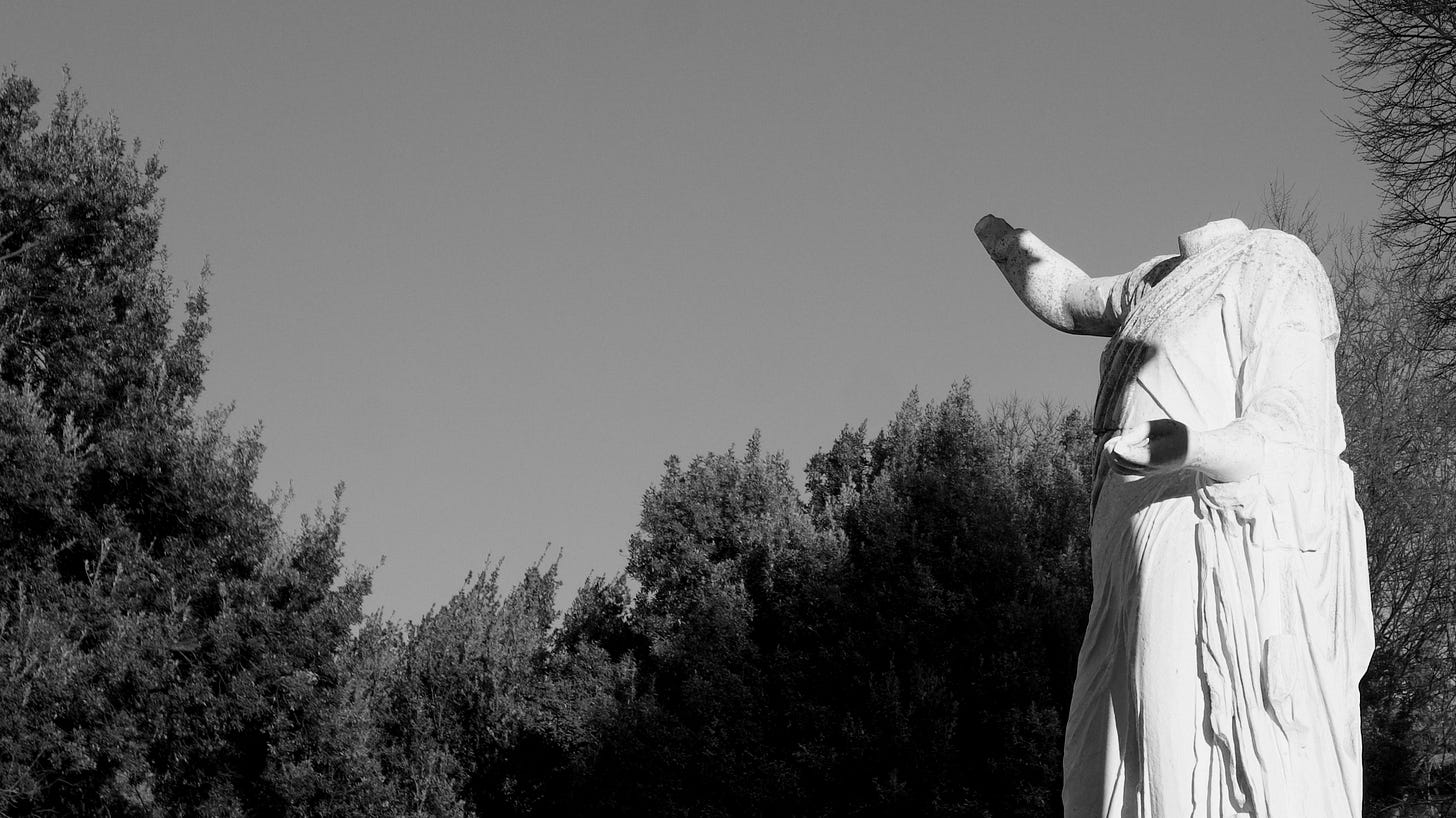The Shaping of Character
Issue 187
Here’s a fairly straightforward claim that is almost certainly true: there’s never been a greater amount of artistic choice. Whether the subject is film or design or novels or music or pretty much anything creative imaginable, we’re all tiny swimmers in an artistic ocean, and the sea level rises a little more each day. We’re amid a deluge of creativity, as goes a very obvious observation, and we’re struggling to stay above the water—to simply learn about the latest books and films and albums, to even approach an awareness of all the new art that appears in the world.
Here’s another fairly straightforward claim that is at least plausibly true: there’s never been a greater amount of antagonism about artistic preferences. Take a step outside, lift your head up, look around, and you’ll hear the shouts: the music that you enjoy is wrong and the books that you adore are problematic and the films that you find captivating are offensive and the paintings that touch you viscerally are, well, it turns out, all paintings are now passé. Not much is deemed illegal—at least not at this point—but there’s a social element to preferences, with disapproval, castigation, and rebuke the methods of enforcement. To quietly enjoy your preferences today is, it seems, to mock those who disagree. And if you just so happen to like the wrong artists, then you must be stopped.
Regardless of how much I consider these two claims, regardless of how empathetic I try to be toward the most strident and earnest voices in contemporary life, this looks peculiar. It isn’t exactly a contradiction to have an endless amount of art and to also have a greater amount of hostility about art—but it certainly feels like a contradiction. How can both the choices and the antagonism increase? Shouldn’t those variables be symbiotic? Because I could at least understand if the chairs in this musical were being snatched away—with fewer books and films and songs present in the world. That would imply more competition, and that would mean that a stranger’s choice subtracts from my choice. For the artistic consumer, however, that’s not the situation: the potential preferences just keep increasing in an endless cascade of new creations. Plainly: what’s with all the fuss? When I listen to music, or engage with an artist, it doesn’t threaten the existence of other music or another artist.
A very good week for me includes at least a few books, some new albums, perhaps some intriguing essays, hopefully at least a few visual artists, exposure to new ideas and theories and projects—and the truth is that nearly all of it is forgettable. What I seem to possess is the underrated skill of moving to what’s next, without much thought for what I’ve left behind, which never really felt that unusual or even thoughtful until this moment. If I’m uninterested in reading a particular novel, it doesn’t bother me if that’s the novel that everyone else does read, and I am already too busy looking for something new to even notice. What I seek in art is particular and visceral and always tricky to find, it is an individual, distinctive voice, the representation of a unique self within a creation, whether that’s found on the page or heard in a song or seen on a canvas. Because this is an implausible and unfair task for artists, I’m perfectly fine with putting down books, turning off albums, and walking away from paintings.
I am pretty good, in fact, at dismissing most creations, which is necessary when you’re hungry for what’s new, when you want to understand the culture, when the art that provokes you will always be rare. This is another way of stating that I regularly encounter art that I don’t find stimulating. Perhaps it is pleasing, perhaps it is skillful, and perhaps I walk away. Yet I’ve never felt that disagreeable art is an assault. I’ve never felt attacked. I’ve never felt bothered by the art that doesn’t strike me as worthwhile. I’ve never felt the need to stick around and to scream and complain about the art that I dislike while berating those who happen to stroll past. I just move to the next book, find a new album, look for another picture, which doesn’t seem all that profound or unusual.
Perhaps one explanation for this contradiction comes from the peculiar manner in which some people create their identity from their preferences. What appears to have happened—accidentally, mysteriously, in recent years—is that the art you like, it seems, defines your character. Knowing what someone prefers in film or music or literature very quickly becomes a shorthand for knowing who they are as a person. Tell me that you like a particular director, and I’ve got a box for you; explain your passion for a type of music, and I can slot you into a precise category; bring up an author that’s not my favorite, and now you’ve crossed a line. Understanding an individual human no longer requires any cumbersome nuance—we have categories and your selection of preferences will determine your character.
Of course defining yourself by your preferences is a rather fragile way of living. When the art that you prefer reveals your character, when it states more about your existence than a mere statement of taste, then you are, as a result, only as strong or confident or valuable as the art that you’ve decided to let represent you as a person. Any criticism of the art that you enjoy is therefore a criticism of you. Any comments about the categories that you supposedly represent is a threat to your identity. Any preference for categories that you don’t even know about is spiteful toward what you do enjoy—because it excludes what you’ve determined is your identity.
Which means that insouciance about other tastes feels impossible. There’s no potential for nonchalance when the subject is so personal. There’s no ability to discriminate, to view from a distance, to consider personal taste as curious and interesting and mysterious rather than defining. Thus there are shouts based on what you read, strictures about the right kind of art, and endless demands from the moralizers and fanatics and totalitarians in our world, shrieking about what you must and, just as crucially, mustn’t prefer in your art. To prefer anything that’s a bit different, or to simply believe that taste is rather superficial, and not a core element of character, is to describe everyone who does define themselves through art as rather hollow. No wonder the shouts are so loud.
If you happen to be young, then this is a perfectly acceptable behavior, and there’s no surprise that music is especially all-consuming and all-defining for many people during those crucial years. There’s nothing wrong with a bit of experimentation. Or with trying on different identities and using art as a portal. When you’re young, the foundation hasn’t yet been poured, and nearly everything that’s encountered fills the new mold, which is normal and probably even beneficial. But there’s a limit: you should, at some point, recognize the artificial nature of artistic categories, and also recognize that personal taste is only a veneer atop character. Learning that someone enjoys heavy metal or classical music shouldn’t, for instance, tell you anything about that person’s character. If that sounds a little off to you, then I would suggest that you haven’t met enough people who prefer heavy metal or classical music, and that your categories are a tad rigid. Knowing artistic preferences—books, films, music—isn’t a sufficient shorthand to teach you about a person.
For those who still insist on defining character based on artistic tastes, there’s probably not much accuracy in the interpretations anyway—the categories that are created are as vapid as the individuals who do the creating. Art might trigger feeling, perhaps touch the intellect, it can even result in passion, but it doesn’t define character. Although once you believe that you shape your character based on tastes that are extrinsic to yourself—you’re forced to defend those tastes as you would defend your character. Because there is, after all, nothing underneath the veneer, and a mere scratch might reveal the internal void. Statements about art become statements of desire: how the speaker wants to be perceived, the status they want to claim, the identity that they crave. What’s described in all these artistic tastes—in the separation of problematic art, in the defining of offensive art—isn’t really pertinent to the art, but simply a reflection of the viewer, which is a bit like looking into a mirror and blaming the mirror for what you see.





I love this essay, it rings true. Enjoyment of art may be an expression of persona or just an act of curiosity and enjoyment, but to have it become the entire persona, like a cobbled-together ransom note from 50 different magazines.... that's dangerous.
Side note, I once had coffee with someone who had dated a person he described as "perfect" - but he'd dropped her when she admitted she didn't know who Pedro Almodovar was.
THIS statement: "... the separation of problematic art ... the defining of offensive art—isn’t really pertinent to the art, but simply a reflection of the viewer, which is a bit like looking into a mirror and blaming the mirror for what you see." Comedian Ricky Gervais talks a lot about this regarding people who are offended by his humor. And, for this same reason, I do not worry about people unsubscribing from my Substack. Interesting topic, Charles, as always.